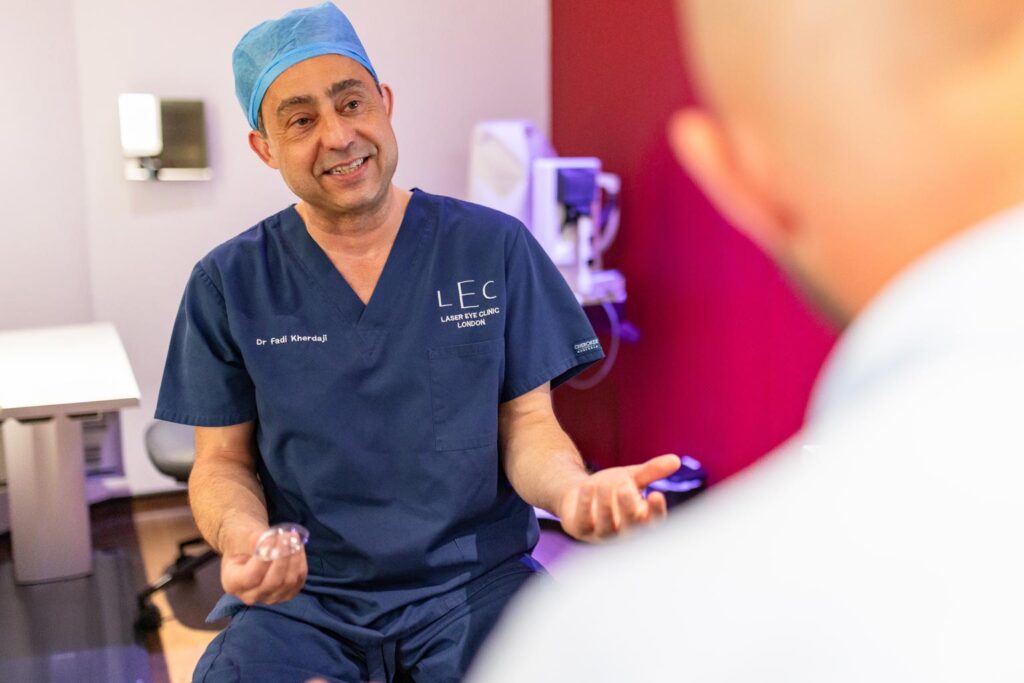Most people think of sleep as downtime for the body. In truth, it’s when some of the most important maintenance work happens, especially for your eyes. Patients often ask me why their vision feels blurrier after poor sleep, or why dry eye flares up after a late night. The answer is that sleep is not just restorative for your mind, but also essential for the health and performance of your vision.
What Happens to Your Eyes While You Sleep
- Tear Film Renewal – During deep sleep, your eyes reset their protective tear film. Poor sleep reduces tear quality, leaving eyes drier and more prone to irritation the next day.
- Nutrient Flow – The eye’s metabolic waste is cleared during rest, with oxygen and nutrients replenishing the cornea and retina. Interrupted sleep compromises this exchange.
- Retinal Processing – Research shows that REM sleep helps “reset” the retina, fine-tuning how your brain interprets light and contrast the following day.
When Sleep Goes Wrong
- Dry Eye Syndrome: People with chronic insomnia are up to 70% more likely to suffer dry eye symptoms.
- Glaucoma Risk: Studies link irregular sleep patterns with impaired blood flow to the optic nerve, raising long-term glaucoma risk.
- Lens Metabolism: Inadequate sleep disrupts antioxidant activity in the lens, potentially accelerating cataract formation.
The Modern Problem: Screens and Sleep
Blue light from phones and laptops doesn’t just make it harder to fall asleep. It also disrupts melatonin, the hormone that regulates circadian rhythms. This double-hit, poor sleep quality and overstimulation, leaves the eyes working overtime without recovery.
Why This Matters for Vision Correction
For patients considering vision surgery, good sleep supports better healing and long-term outcomes. A well-rested eye is less inflamed, more hydrated, and better equipped to adapt to new lenses, whether that’s after cataract surgery, refractive lens exchange, or laser correction.

Eye Conditions Linked to Poor Sleep
| Eye Condition | How Sleep Plays a Role | Risk / Impact | Future Solutions & Vision Enhancements | Source |
| Dry Eye Syndrome | Reduced tear renewal and poor eyelid closure during fragmented sleep worsen tear film quality. | Insomnia patients have up to 70% higher prevalence of dry eye. | Lifestyle sleep hygiene + advanced dry eye therapies (lipiflow, IPL). Post-surgery, premium lenses reduce reliance on contact lenses, easing dryness. | Sleep Medicine Reviews, 2021 |
| Glaucoma | Sleep apnoea and irregular sleep impair optic nerve blood flow and oxygenation. | Up to 40% higher glaucoma risk in people with sleep apnoea. | Sleep apnoea treatment + early monitoring with OCT scans. Future: AI-driven optic nerve analysis can catch subtle changes earlier. | American Academy of Ophthalmology (AAO) |
| Cataract Formation | Lack of restorative sleep reduces antioxidant activity in the lens, allowing oxidative stress to accelerate opacity. | Poor sleepers show higher early cataract prevalence. | Cataract surgery with premium IOLs restores clarity. Future: light-adjustable lenses could fine-tune vision for individual needs. | Investigative Ophthalmology & Visual Science, 2020 |
| Retinal Disorders | Disrupted circadian rhythm affects photoreceptor recovery and light processing. | Night-shift workers show higher rates of retinal vascular changes. | Better sleep hygiene + early detection with retinal imaging. Future: gene and cell therapies may help protect light-sensitive cells. |
Poor sleep raises risks, but it doesn’t lock patients into poor outcomes. By combining better sleep habits, modern treatments, and next-generation vision enhancements, we can not only prevent decline but actively restore and future-proof sight.
Practical Tips I Give My Patients
- Step away from screens at least one hour before bed.
- Keep your bedroom cool and dark to encourage REM cycles.
- Stay hydrated, but avoid alcohol late at night! It dries both the body and the eyes.
- If you snore or have sleep apnoea, seek treatment. It’s not only heart-protective, but eye-protective too.
Your sleep time is important!
Sleep is a simple, often overlooked factor in eye health. Yet it has the power to influence everything from your daily comfort to your long-term risk of conditions like glaucoma or cataracts. As a surgeon, I remind my patients that surgery is only one part of the story, how you live, sleep, and care for your eyes determines the quality of your vision for decades to come.


